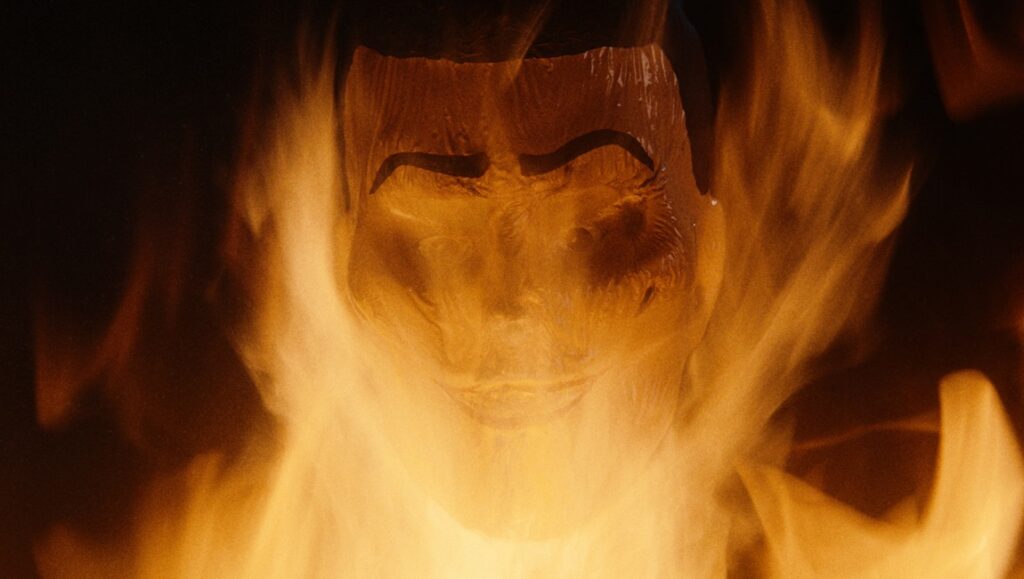In a rather brazen move, the third title card in the end credits of new horror flick Don’t Look Away reads as a dedication to genre legends Sergio Martino, John Carpenter, and Larry Cohen, firmly establishing that filmmaking duo The Michaels — director/co-writer Michael Bafaro and co-writer/star Michael Mitton — know their screen history. Yet if one were to guess their genre influences based solely on the movie that had unspooled leading up to those credits, the names that would more immediately spring to mind would be the likes of Stanley Kubrick, David Robert Mitchell, and… Fede Alvarez — in other words, sans the cinephile cred of an obscure Italian Giallo filmmaker like Martino. Why namecheck masters like Fulci and Argento when you can assert your superiority in the most obnoxious way possible? It’s worth noting because that level of misplaced narcissism can be found throughout Don’t Look Away, a one-note thriller that mistakes derivation for homage at every turn.
As the film opens, a gang of criminals seek to rob a semi-truck of its loot, but instead find a large box containing a naked mannequin with thin limbs, sunken eyes, and a toothsome grimace. They are instantly dispatched by the evil entity, while the driver stumbles into traffic and is run over and killed by graduate student Frankie (Kelly Bastard), who catches a glimpse of the malevolent figure in her rearview mirror before it vanishes into thin air. It isn’t long before the plaster eunuch is stalking our protagonist, dispatching of various members of her friend group and destroying her relationship with PhD candidate Steve (Colm Hill), a man who at one point screams at Frankie, “You don’t know what a moral or ethical principle even is!” — and nothing within the film suggests that it is meant to be taken as a joke. The majority of Don’t Look Away consists of Frankie and her friends walking around various domiciles and locations while a mannequin is placed somewhere in the background, silently watching. It’s quite clear that The Michaels believe this to be the scariest thing imaginable, but in reality the mannequin simply looks ridiculous, and the film’s imagery is never not funny. This is especially true of an absolutely ludicrous chase scene set in broad daylight, where the mannequin is simply standing in high-traffic areas, as if the juxtaposition was supposed to be terrifyingly unnerving instead of absurd.
In both look and feel, the film comes across as a misguided mash-up of 1979’s borderline campy killer-mannequin flick Tourist Trap and the deadly solemnity of 2014’s It Follows, the latter proving especially influential in the film’s production design, a combination of the modern and the vintage, analog and digital. Rotary phones butt heads with cell phones, while the interior design of every space looks like it was airlifted out of a 1976 Architectural Digest, with enough wood paneling to kill a forest. The color palette favors teals and oranges, which is quite possibly the laziest visual contrast a filmmaker could highlight in 2023, and a number of ’70s-era filmmaking tics are on full display, from split diopters to crash zooms to strobe lighting. Meanwhile, the dialogue is exposition-heavy and clunky, and the acting is some of the worst witnessed by this critic in ages. Bastard fares best, as she has something akin to inflection in her line delivery, while everyone else aspires to the highs of Mariah Carey in Glitter — and yet none even reach that. And Steve ultimately winds up having to re-enact The Shining, a movie which the characters are seen watching at one point, because The Michaels apparently think their viewers are the dumbest people on the planet.
Then there is the matter of the final act, in which the movie suddenly becomes 2016’s Don’t Breathe, but for no discernible reason. Through it all, Bafaro actually acquits himself as a technician — there are few stray moments that display a clear understanding of shot composition and screen geography — but it’s all so highly derivative that any praise necessarily falls by the wayside. If there’s one unqualified strength to observe, it’s the film’s synth score, courtesy of Phil Western and Matt Dauncey; it’s appropriately moody and effectively atmospheric, but the fact that it’s a synth score Bafaro has chosen to deploy once again testifies to the obviousness on display in every facet of the production. Ultimately, the title Don’t Look Away seems more like a dare to anyone unfortunate enough to have to sit through this 83-minute exercise in indulgent artistic rehash. Don’t tell us what to do, Michaels, thanks.
DIRECTOR: Michael Bafaro; CAST: Kelly Bastard, Michael Mitton, Colm Hill, Rene Lai; DISTRIBUTOR: Level 33 Entertainment; IN THEATERS: September 1; RUNTIME: 1 hr. 21 min.


Comments are closed.